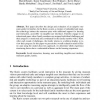Free Online Productivity Tools
i2Speak
i2Symbol
i2OCR
iTex2Img
iWeb2Print
iWeb2Shot
i2Type
iPdf2Split
iPdf2Merge
i2Bopomofo
i2Arabic
i2Style
i2Image
i2PDF
iLatex2Rtf
Sci2ools
108
click to vote
ECTEL
2009
Springer
2009
Springer
Experience Structuring Factors Affecting Learning in Family Visits to Museums
Abstract. This paper describes the design and evaluation of an adaptive museum guide for families. In the Kurio system, a mixture of embedded and tangible technology imbues the museum space with additional support for learning and interaction, accessible via tangible user interfaces. Families engage in an educational game where family members are assigned individual challenges and their progress is monitored and coordinated by the family member with a PDA. After each round of challenges, the family returns to a tabletop display to review their progress. In this paper we present the overall evaluation result of Kurio and, using the model discovery approach, we determine which experience structuring factors have a substantial influence on the learning experience.
| Added | 17 Feb 2011 |
| Updated | 17 Feb 2011 |
| Type | Journal |
| Year | 2009 |
| Where | ECTEL |
| Authors | Marek Hatala, Karen Tanenbaum, Ron Wakkary, Kevin Muise, Bardia Mohabbati, Greg Corness, Jim Budd, Tom Loughin |
Comments (0)

